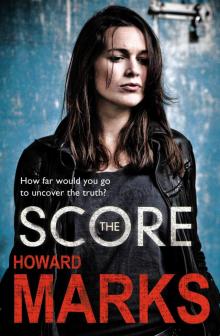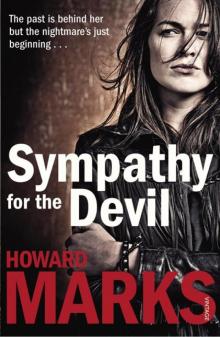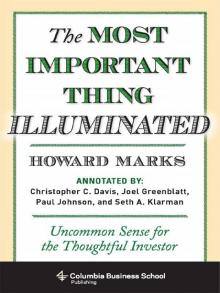- Home
- Howard Marks
Senor Nice Page 4
Senor Nice Read online
Page 4
‘This gets better and better, Auntie ’Fon. Any others?’
‘Well there’s my mother’s half-brother Madoc. I can’t go into it too much. I think there was a bit of incest going on. There was more of that in those days. But he’s the bugger who gave me my name, Afon Wen, which I’ve never been bloody keen on. You know what it means, don’t you?’
‘Of course. It’s Welsh for White River.’
‘That’s right. A bloody good name for a squaw, don’t you think? Madoc always claimed he was a Red Indian brought up in a wigwam with totem poles outside it.’
‘Perhaps he was an opium addict too?’
‘Maybe. He did have some crackpot ideas. Thought he was a direct descendant of a Welsh prince who was also the first of the Incas. He used to say the Incas were his bloody cousins. I ask you! Mind, Madoc was all bloody there all right, and he certainly had Red Indian blood in him from somewhere.’
‘Do you know which tribe?
‘No idea. They spoke Welsh, according to Madoc. God knows how.’
‘What happened to Madoc in the end?’
‘He wanted to go to Patagonia and join the Welsh colony there. A lot of people from the valleys round here had gone to Patagonia for a new life, and they got on very well with the Indians, by all accounts. Madoc got jealous because he had always felt he belonged on the other side of the Atlantic with the Red Indians and their wigwams. He never made it though, poor bugger. He got killed by lightning.’
I drank my tea, smoked a couple of fags and bid Auntie ’Fon goodbye.
‘Don’t leave it so bloody long next time.’
I never saw her again.
The oldest surviving member of my paternal family was my grandfather’s eldest sister, Katie Marks. She was ninety and lived in her own flat in Kenfig Hill. I had never known her very well and hadn’t seen her for about fifteen years. Maybe she would have some stories to tell.
‘Auntie Katie.’
‘Hello, Howard bach. Lovely to see you after all these years. You must be glad to be back from America. What are you doing with yourself these days?
‘Writing and doing shows. I’ve turned over a new leaf.’
‘That’s right, Howard bach, put the past behind you.’
‘Well, actually, Auntie Katie, it’s the past I wanted to talk to you about.’
‘Oh dear! How can I help?’
‘Who was my Grandfather Tudor’s father?’
‘Dafydd Marks. He owned half of Kenfig Hill.’
‘And who was his father? Was that Patrick Marks?’
‘That’s right. Patrick Marks, a very religious man in the end. He is buried up the road in Siloam chapel, Cefn Cribbwr.’
‘And his father? Who was that?’
‘Well, that’s where it does get a bit confusing. It seems that Patrick changed his name from McCarty to Marks.’
‘Why?’
‘There are three theories. One was to inherit a lot of money from a German Jewish family called Marks who worked the coal mines round by here. Another was to hide himself because he had made a lot of money abroad in a way he shouldn’t have, and the foreign police were after him.’
‘How did he make his money?
‘Now that I don’t know. He made it somewhere in America.’
‘North or South America?’
‘I don’t even know that. But the third theory, and this is the one I think is true, was to get rid of the bad name and reputation of his relative, who was Billy the Kid, of course.’
‘What! How closely related were they?’
‘Patrick’s father, who was also called Patrick, was Billy the Kid’s father as well, but with another woman.’
‘This is incredible. My great-great grandfather was Billy the Kid’s brother.’
‘Half-brother, I think, isn’t it? But there’s more, Howard bach, lots more. The McCartys were also in Jesse James’s gang and got together with Butch Cassidy and the Sundance Kid in Patagonia, a Welsh colony and the headquarters of all the Irish and Welsh cowboys in those days. It was there that Patrick learned Welsh. Anyway, after years out in South America, he decided to come and live here in South Wales under another name. I’m sure Denny, your dad, was given everything that Patrick wrote. Probably in a box somewhere in your house. Not that changing his name did Patrick much good, mind. His son, your great-grandfather Dafydd’s brother, Willie Bevan Marks, became a notorious Chicago gangster. He was Bugs Moran’s first lieutenant. I wasn’t a bit surprised you became a famous smuggler, not a bit.’
‘Is this true, Auntie Katie?’
‘Every word. Why do you think your Grandfather Tudor’s brother Tommy called all his children something Bevan Marks, including the girls? He was hoping Willie would leave them his money.’
‘Did he?’
‘Not a penny.’
I decided to check the veracity of this avalanche of information about my ancestry and called into Kenfig Hill library to surf the Net.
Billy the Kid was born in 1861 in New York to Patrick and Catherine McCarty and named William Henry McCarty. A few years later Patrick left Catherine, who married William Antrim and died when young Billy was thirteen. Billy became an outlaw, teaming up with Welshman Jesse Evans, the leader of a gang of rustlers called The Boys. To avoid capture, Billy changed his name to William H. Bonney.
At the beginning of Prohibition, Willie Marks joined Dean O’Bannion’s North Side Gang of Chicago and was best friends with fellow member George ‘Bugs’ Moran, who later became leader of the gang and made Willie Marks his second in command. His duties included the management of the gang’s South American interests. Willie Marks narrowly missed being murdered in the St Valentine’s Day massacre but was later fatally machine-gunned by Al Capone’s James ‘Fur’ Sammons, a well-known psychotic who was convicted of the rape, mutilation and murder of an eleven-year-old schoolgirl. Willie Marks is buried in Woodlawn Cemetery in Forest Park, Illinois.
I was about to research Prince Madoc, the Mandans, the Welsh Incas and the ever-increasing connections with Patagonia when the familiar figure of Marty Langford ambled into the library.
‘I heard you were here. You know the council has withdrawn funding for the Royal Pavilion since last night’s shenanigans, don’t you? You’ve stirred the place up again. There’ll be no more of your shows round here.’
‘Oh no! Never mind. Fancy a pint?’
Two
WELSHMEN
The scene which greeted us back at the Royal Oak bore a marked likeness to that of the day before. The television was showing precisely the same rugby match, although a highlighted version. Ivor Prior and Eddie Evans were sitting in the same seats waiting for the match to end so they could get on with the regular Sunday afternoon quiz. The rest of the pub’s customers were watching the match as intently as they had been twenty-four hours earlier, displaying no sign they already knew the result.
‘Well, what an achievement!’ said Eddie. ‘Getting the local council to withdraw financial support for the Royal Pavilion. The end of an era, that’s what it is. I’ve spent all my bloody life trying to bring culture to the masses down by here, and you ruin it in one night. Now there isn’t anywhere in the area where we can put on plays, operas and concerts. I hope you’re pleased with yourself.’
‘You’re being too harsh on him, Eddie,’ said Ivor, springing to my defence. ‘If the council wanted to put on your daft bloody plays, they wouldn’t let something like Howard puffing on a stage get in the way.’
‘You’re probably right, Ivor,’ conceded Eddie unexpectedly. ‘They were just looking for an excuse. I was only joking, Howard. The Porthcawl councillors are nothing but a load of tossers. Anyway, it’s quiz time in a few minutes. Get your brains working.’
The match finished, and the viewers, every bit as disappointed with Wales’s dismal performance as before, took their seats for the quiz. Eddie perched on a high stool at the bar to preside over proceedings.
‘We’ll start with one for you sports fan
s. Where and when did the first ever sports event under floodlights take place?’
The question met with silence. I could see from Marty’s facial expression he knew the answer but was too shy to shout it out. There was little about Wales and matters Welsh Marty didn’t know, but he had taught himself and had little experience of vocalising his wealth of knowledge.
‘Well, I thought you lot would know that, at least. I deliberately started with an easy one. The first ever sports event under floodlights took place in Cardiff in 1877 at a Cardiff-versus-Newport rugby match.’
Marty nodded and smiled.
‘Next question. You all eat cornflakes, I’m sure. What’s the origin of the name Kellog’s, the cereal company?’
Another silence.
‘Come on. You probably had some this morning. All of you. Think of the packaging.’
Again, it was obvious that Marty knew the answer, but he still kept his peace.
Eddie carried on: ‘Kellog comes from the Welsh for chicken, ceiliog. There’s a picture on every packet.’
And so it continued, every question asked and answered by Eddie, every one another Welsh fact.
The final question: ‘Who won the first ever recorded libel case? I’m not even going to bother to ask if anyone knows the answer. I know no one does. It was—’
‘I know,’ interjected Marty, finally plucking up the courage to speak. ‘The first ever recorded libel case was won by Henry Morgan.’
‘You are right, boy bach. Well done! Henry Morgan the buccaneer, probably the greatest Welshman ever, much more impressive than Alexander the Great in my opinion, sued the Dutchman Esquemeling for writing that he was sent overseas because of his criminal behaviour. The Dutchman was right, mind, but that’s another tale. You should write Henry Morgan’s life story, Howard; it’s a lot more impressive than yours.’
‘Where was he born, Eddie?’ I asked out of genuine interest.
‘Somewhere on the border between Glamorgan and Monmouth, I think. His family lived in a big mansion near where the M4 is now. It’s still there.’
‘There was something else I wanted to ask you, Eddie.’
‘Go ahead. I’m always happy to quench an Oxford graduate’s thirst for knowledge.’
‘Yesterday afternoon you were talking about Merlin advising King Arthur.’
‘That’s right, I was. I’m pleased you remember. I thought you would have forgotten everything other than the fact that Elvis was of Welsh descent. I know you are a big fan. Not that he could sing all that well. His version of “O Sole Mio” is diabolical, absolutely diabolical.’
‘I preferred the old Elvis,’ Ivor put in, ‘when he was younger.’
‘That doesn’t make too much sense, Ivor. Think about what you are saying for once,’ said Eddie.
‘I’m saying I liked Elvis’s early songs, before he joined the army. Mind, we’ve all passed a lot of water under the bridge since then. And one man’s meat isn’t everyone’s cup of tea, of course. I accept that.’
‘You are mixing your metaphors a bit too much there, Ivor. But let’s get back to the point. Yes, Howard, the first ever Christian kingdom’s throne was Camelot, which was at Caerleon, a city the Romans built on an old Druidic site just outside Newport. Caerleon had a huge amphitheatre, much of which is still visible today. Arthur had twelve knights doing his bidding in the same way the twelve disciples served Jesus Christ.’
‘But Eddie,’ I asked, ‘why did Christianity take off here, if it did, rather than anywhere else in the world?’
‘Well, it took off, as you put it, in all sorts of places, but here was the first country that had a Christian king – Arthur.’
‘So why was that?’
‘It’s something I’ve done no end of research into. I have my own theories, of course, all backed by historical fact, but every time I mention them, I’m called a blasphemer.’
‘I promise not to.’
‘I couldn’t give a bugger if you did. I’ve been called worse by better. I’ll explain. What’s the name of the Catholic church here in Pisgah Street?’
‘St Joseph of Arimathea,’ I answered.
‘Correct. And who was Joseph of Arimathea?’
‘The guy who paid for Jesus’ tomb in Jersualem.’
‘Yes, everyone knows that, but who was he? Where did he come from?’
‘Arimathea?’ Ivor conjectured.
‘I mean what family, Ivor, as you well know.’
‘No idea, Eddie. Unless Arimathea is the old name for Kenfig Hill.’
‘No need for sarcasm, Ivor. What I’m going to say is fundamental, absolutely fundamental. Joseph of Arimathea was the same person as Joseph, husband of Mary, mother of Jesus.’
‘Why doesn’t the Bible say that, then?’ asked Ivor. ‘I just can’t believe the lies you are coming out with lately.’
‘Ivor, the Bible doesn’t say that wasn’t the case, and it doesn’t say that Joseph, husband of Mary, came from anywhere else, does it?’
‘Maybe not; I don’t know. But what’s a carpenter from Arimathea, what ever that is, doing buying and selling tombs in Jersualem? The Bible said Joseph was a carpenter. I know that much, Eddie.’
‘Simple, Ivor. It’s a mistranslation: it shouldn’t be carpenter; it should be mason. That’s where a lot of this freemasonry rubbish comes from. I’ll continue. Howard and Marty here are genuinely interested. In AD 33 Joseph brought the body of his son Jesus, as well as the Holy Grail, to Glastonbury, where he planted his staff, which grew into the famous thorn tree there. Glastonbury was an important place in ancient Britain.’
‘Glastonbury is in England, not Wales.’ Ivor looked pleased with his point.
‘Ivor, as I have pointed out on more than one occasion in this very room, the ancient Britons were the Welsh. Ancient Britain, the first country in the world to move into the Iron Age in about 1000 BC, was a cultured country whose language, Welsh, was spoken throughout what is today the United Kingdom and was understood in most of Europe.’
‘I bet they didn’t speak it in Scotland.’
‘Of course they did, Ivor. Don’t show your ignorance. Taliesin, the greatest ever Welsh poet, spent all his life near Glasgow, which itself is a Welsh word meaning blue meadow. What I’ve said so far most people know and accept as fact; what a lot of people don’t know, however, is that Joseph and Jesus had visited ancient Britain years before. The family owned extensive tin mines in Cornwall and often came to oversee matters.’
‘You’re opening a real tandoori box now, Eddie. I doubt if many people will believe that,’ said Ivor.
‘Well, the brilliant William Blake did, Ivor.’ Eddie then suddenly burst into song:
‘And did those feet in ancient time
Walk upon England’s mountains green?
And was the holy Lamb of God
On England’s pleasant pastures seen?
And did the Countenance Divine
Shine forth upon our clouded hills?
And was Jerusalem builded here
Among these dark Satanic mills?’
The rest of the pub looked puzzled – just ten minutes ago they had been singing ‘Sospan Fach’ to the accompaniment of the rugby highlights – but at the beginning of the next verse they joined in with full power.
‘Bring me my bow of burning gold:
Bring me my arrows of desire:
Bring me my spear: O clouds, unfold!
Bring me my chariot of fire
I will not cease from mental fight
Nor shall my sword sleep in my hand,
Till we have built Jerusalem,
In England’s green and pleasant land.’
Shelves of bottles and hanging lampshades resonated furiously with the strong harmonies that only a Welsh male voice choir can provide. Then came an impromptu ‘Bread of Heaven’, followed by another final rendition of ‘Sospan Fach’. Silence eventually fell but it was broken after less than a minute by Ivor: ‘Anyway, I don’t believe Jesus came back fro
m the dead.’
‘That’s entirely another matter, Ivor,’ said Eddie. ‘Some people do; they believe Jesus suffered on the cross for our sins.’
‘Suffered on the cross!’ protested Ivor. ‘Jesus’ sufferings were nothing like as bad as the pain millions of people have had to put up with. If I was as sure of living for ever as Jesus was, I wouldn’t mind being nailed to a bloody cross for a few nights.’
‘Now show some respect, Ivor, please. It is a Sunday, after all.’
But Ivor was in top gear. ‘There isn’t another world. We haven’t got any bloody souls. You see all this stuff in front of you with your eyes, and when you shut them or go blind, you don’t see any of it anymore. It’s exactly the same with our brains. When our brains decay, we forget everything. When we die, everything dies with us. It’s the same for us as for all other animals. You all know this. You’re just kidding yourselves.’
No one took any notice. They had heard it all before.
‘What was in that Holy Grail, Eddie?’ I asked, thinking of the mushrooms I had been given the previous night.
‘I can’t pretend to know the exact ingredients, but whoever drank a single drop would either die like a demon, live for ever, or pass on a bit of divinity or a kingdom to his son or grandson, depending on who the mother was. Joseph’s grandson, the Welsh hero Caradoc, was born very near here and became king of ancient Britain. Caradoc refused to bow his head to the Romans and was taken to Rome as a prisoner. The Romans respected him, cut him loose and gave him a taste of the high life. After a while Caradoc came back to Wales and brought with him none other than St Paul, who set up his church in Caradoc’s parish, Llanilid, just outside Bridgend.

 Mr Nice
Mr Nice The Howard Marks Book of Dope Stories
The Howard Marks Book of Dope Stories Senor Nice: Straight Life From Wales to South America
Senor Nice: Straight Life From Wales to South America The Score
The Score Sympathy for the Devil
Sympathy for the Devil The Most Important Thing Illuminated
The Most Important Thing Illuminated Senor Nice
Senor Nice Howard Marks' Book of Dope Stories
Howard Marks' Book of Dope Stories